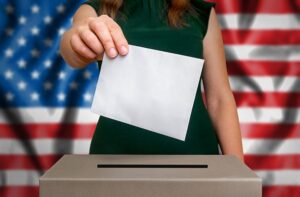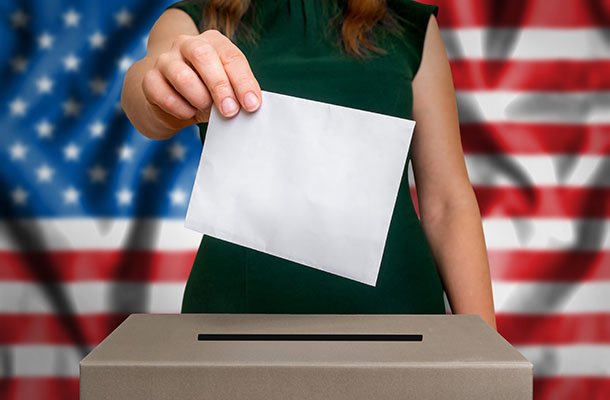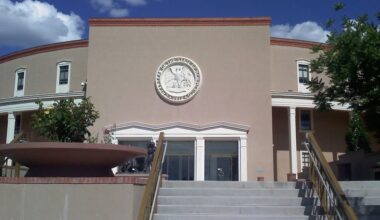 Rodriguez v. Newsom may never make it onto the Supreme Court’s docket. Which would be a shame, because it asks a lot of important questions about how America’s presidential elections operate and holds the potential to radically reframe the way the country views itself as a polity. Exactly the sort of weighty constitutional questions that the Supreme Court should take up, though likely questions that the conservative-dominated Court doesn’t want to address right now.
Rodriguez v. Newsom may never make it onto the Supreme Court’s docket. Which would be a shame, because it asks a lot of important questions about how America’s presidential elections operate and holds the potential to radically reframe the way the country views itself as a polity. Exactly the sort of weighty constitutional questions that the Supreme Court should take up, though likely questions that the conservative-dominated Court doesn’t want to address right now.
The case is brought by a pair of California Republicans and a pair of non-profit organizations and alleges that the “winner take all” system of awarding presidential electors that prevails in every state except Maine and Nebraska amounts to an unconstitutional dilution of their right to vote. A California Republican’s vote is undeniably as worthless in any presidential election as a Utah Democrat’s, at least as a practical matter. No one’s going to vigorously contest in those states, ad dollars aren’t going to flow in, and the fact that there’s any turnout at all is more out of spite than a genuine belief in the power of the franchise.
It’s important to clarify what the case is not. It’s not an attack on the electoral college as an institution. Unlike a national popular vote, the relief requested would maintain the tradition of states appointing electors to do the actual job of selecting the next president. What it would do is force states to divvy up those electors to better reflect the actual votes being cast as an equal protection matter.
The attorneys filing this petition are Harvard Law’s Larry Lessig, Luis Vera Jr. of San Antonio, and James Denvir and David Boies of Boies Schiller Flexner.
Winner take all presidential elections have faced constitutional challenge before, but what’s changed since the Court summarily affirmed a decision upholding the system from the 1960s — and while Susan Collins hypes stare decisis, the current Roberts Court is more likely to flip established precedent on a percentage basis than even the Warren Court — is the rise in laws banning faithless electors. With states barring electors for employing independent judgment, the — mostly illusory — concept of an indirect presidential election has transformed into a carte blanch declaration that a plurality of the electorate commands 100 percent of the voting power. As the brief points out, it would be unconstitutional for a state to fill the entire state legislature with one party’s candidates just because that party got more overall votes across the state, so why is that allowed when electing electors?
Boies hopes that the Court sees the overarching merit of the case. “If the justices take the long view as to what’s good for the country, and not the short view of what’s good for one political party or the other, they will see that this, over the long-term, will benefit both parties, strengthen the political system, and reduce pressures for divisiveness.”
My initial reaction to this dispute was that it invites all manner of ridiculous mischief. I’m old enough to remember Virginia trying to “fix” the 2012 election by changing the distribution of electors from winner take all to a congressional district model akin to Maine and Nebraska — a move that would have changed Obama’s relatively comfortable 4 point win in Virginia to 9 votes for Romney and 4 votes for Obama. If 13 votes for a 4 point victory is a dilution of voter power, a 5 vote deficit for a victory is surely an affront to the Constitution. This could all be avoided if the Electoral College were fully divorced from House of Representative membership, which is admittedly provided for in the original TEXT of the Constitution, but not a single Framer would think that the House voting to cap membership in 1921 could perform an end run around the Constitutional amendment process. But, alas, that’s definitely a challenge that this Court won’t hear.
Boies responded to the congressional district apportionment concern by pointing out that a Supreme Court opinion grounded in equal protection wouldn’t countenance a remedy based on gerrymandering as that would surely make the problem worse. That’s true, but I’m not sure I trust this Supreme Court as much — especially after it so recently waved the white flag on protecting the right to vote against partisan gerrymandering — to take this as anything more than an invitation to adopt congressional district electoral voting and, by extension, carry gerrymandering into the presidential sphere.
But Boies thinks that’s inevitable in the status quo. The brief details the history of winner take all electoral apportionment and points out that it not only wasn’t the “original public meaning” of Article II’s requirement that states apportion electors “in such manner as the legislature thereof may direct,” with neither the convention nor the Federalist Papers commenting on it and Jefferson explicitly writing that it was a bad idea, but one that his followers should adopt because supporters of John Adams had already done so. Boies said that while Democrats have largely defended delegating districting to independent commissions to end the scourge of gerrymandering, “I’m surprised good governance wing of the Democratic Party has won out over the political realism wing.” Eventually, he says, Democrats will begin to gerrymander Blue states as aggressively as Republican legislatures have gutted Wisconsin as a matter of survival under the broken electoral college system.
The petitioners believe that the right solution, and the solution supported by the equal protection rationale, is a proportional allotment of electors. If 63 percent of Californians vote for Biden then he should get (opens calculator) electors and not 55. That said, Mississippi should give 2 of its 6 votes to the Democrats. It’s a model that some post-Soviet states adopted — and not for electors, but for parliament itself — when drawing up their own constitutions so it’s not without precedent.
Personally, I think any decision that this Court would make would hypercharge gerrymandering… until that “good governance wing” of the Dems decides to make every upstate NY district include a borough of the City. At which point everyone has to concede and adopt another path. Plus, the legal precedent about diluting votes across counties doesn’t work great for potential presidential gerrymandering.
Could such a thing really heal divisiveness? That’s a lot to hang on one dispute, but Boies makes a good deal of sense in his pitch.
It makes the result more closely correspond to voter choice. It accomplishes a number of secondary objectives — compete in every state — there are only a handful of battleground states. This would bring more people into the process. Candidates would have to compete nationally. There would be more incentive to try to appeal to the middle because every vote does count. Today, if you can’t get to 50.1 percent in a state, it’s not worth trying. One positive secondary effect is to make the parties engage in a real debate that brings country closer together. The winner take all effect tends to atrophy the minority political party in a state.
This party atrophy effect is very real. What state party apparatchik even bothers with turnout initiatives in elections that won’t matter. The Stacey Abrams-led initiative to get Georgia voting was impressive but relied upon the recognition that the state was remotely close. Even though mass turnout might flip a state House district in a random locale, that’s often depressed by the top of the ticket feeling out of reach to despondent partisans. And if the party is weak then the community bonds are weak and it just further exacerbates the minority party’s hopes of exerting any longer term influence.
While the case presents a question that should be isolated from the partisan demands of the moment, the Originalists on the Court — who really only care about the contemporary policy positions of the Republican Party despite the “original public understanding” of the Constitution — would do well to consider what happens when Texas narrowly flips to the Democrats in statewide elections. It’s a result that’s probable in the short-term and all but inevitable in the medium-term and one that fully dooms Republicans nationally if it happens.
Oh, Supreme Court. We could fix the deepening divisions in the country and encourage folks who feel disenfranchised in this nation. But ahead is an all-but announced Donald Trump 2024 campaign. Or at the very least a Don Jr. campaign pressing against Sam Alito and ACB.
Yes. Isn’t it pretty to think so?
(Flip to the next page to read the petition.)
Earlier: Why Is The Electoral College Constitutional?
 Joe Patrice is a senior editor at Above the Law and co-host of Thinking Like A Lawyer. Feel free to email any tips, questions, or comments. Follow him on Twitter if you’re interested in law, politics, and a healthy dose of college sports news. Joe also serves as a Managing Director at RPN Executive Search.
Joe Patrice is a senior editor at Above the Law and co-host of Thinking Like A Lawyer. Feel free to email any tips, questions, or comments. Follow him on Twitter if you’re interested in law, politics, and a healthy dose of college sports news. Joe also serves as a Managing Director at RPN Executive Search.
Medical Disclaimer:
The information provided in these blog posts is intended for general informational and educational purposes only. It is not a substitute for professional medical advice, diagnosis, or treatment. Always seek the advice of your physician or other qualified healthcare provider with any questions you may have regarding a medical condition. The use of any information provided in these blog posts is solely at your own risk. The authors and the website do not recommend or endorse any specific products, treatments, or procedures mentioned. Reliance on any information in these blog posts is solely at your own discretion.






